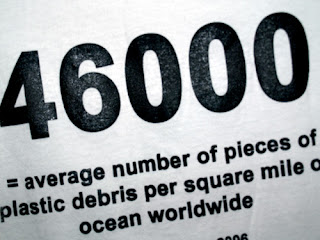
Went to a great exhibition today called "Walking To Save Some Sea". Responding to a UN report (2006) that says there is an average of 46,000 pieces of plastic litter per square mile of the ocean worldwide, artist Fran Crowe spent a year beach combing in Suffolk for plastic. The result is a stunningly well executed and thought provoking exhibition at Languard Fort, Felixstowe.
As I posted here a few weeks ago, last year I resurrected my McJunk project, an ongoing photographic study of McDonalds detritus. I am a firm believer of the adage, "If you won't clean up your own shit, you shouldn't expect others to do it for you", and litter has become, in my mind, an appropriate metaphor for current attitudes towards society. Unfortunately I see too often the results of a 'sod the consequences/look after number one' mentality that has evolved as a result of, and indeed, has been nurtured by, the holy trinity of government, shareholders and city traders - namely: unbridled Capitalism. To add insult to injury, high street stores are bandwagon jumping onto populist ideas such as banning carrier bags as if they haven't known the environmental facts about them for years. But because it's now fashionable amongst the chattering classes and business can see the marketability angle, they try to portray themselves as acting 'responsibly'. Go figure, when have responsibility and Capitalism ever been easy bedfellows? And when are they really, I mean really, going to address the over packaging of goods. Let me guess, when it makes good marketing sense to do so.
Ho hum, sorry about the rant, but that's the result of going to a thought provoking exhibition. Go and give it a look, it's running until 5th May. See selected photos below. Langaurd Fort details available here, and Fran Crowe's website available here.








1 comment:
Interesting looking work. Plastic waste is on the news right now. It seems that it is marine life such as sea birds and some fish that are most threatened. Some environmental activists have pointed out that the plastic bag problem, while an admirable cause for the likes of the Daily Mail to be championing is a drop in the ocean (literally?) compared to other more urgent and larger scale environmental problems. The plastic bag campaigns are a bit of a smokescreen, a relatively easy thing to legislate and a campaign to get behind compared with the damage done by, let's say, the oil industry. The DM will be the first to complain when the price of petrol goes up. Of course it's true that nobody wants to see the fish and bird population threatened by human waste.
What I find interesting about Fran Crowe's work is how much it reminds me of Andy Goldsworthy's constructions (lot's of circular forms made of irregular shaped objects, arrangements of colour, texture. Goldsworthy famously of course builds structures from wood and stone and other materials he finds in the countryside and remote areas. In echoing this Crowe seems to me to be suggesting that this trash is now part of 'nature', it is in the 'natural world', which is to say that there is, perhaps never has been, any such thing as nature - it's just that now human agency in the construction of nature is inscribed in its very materials.
Post a Comment